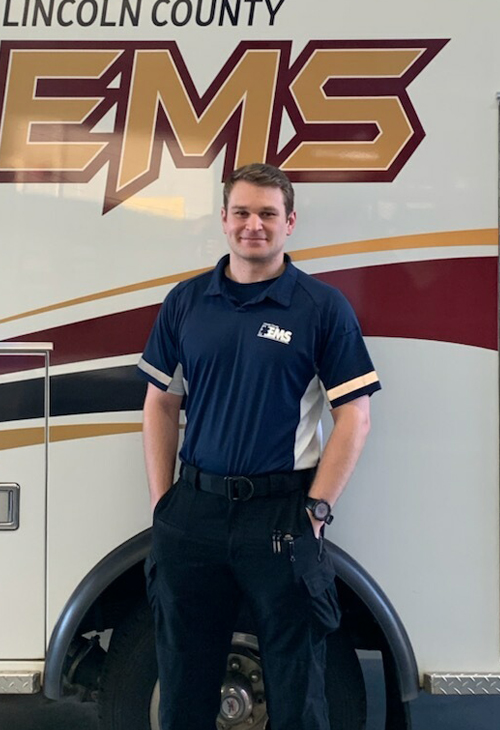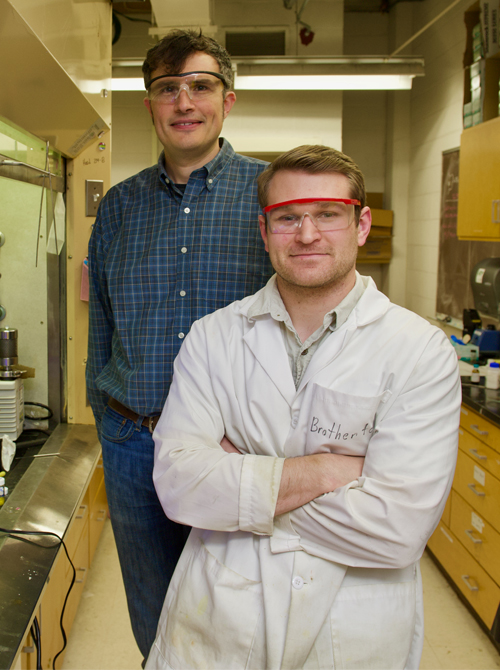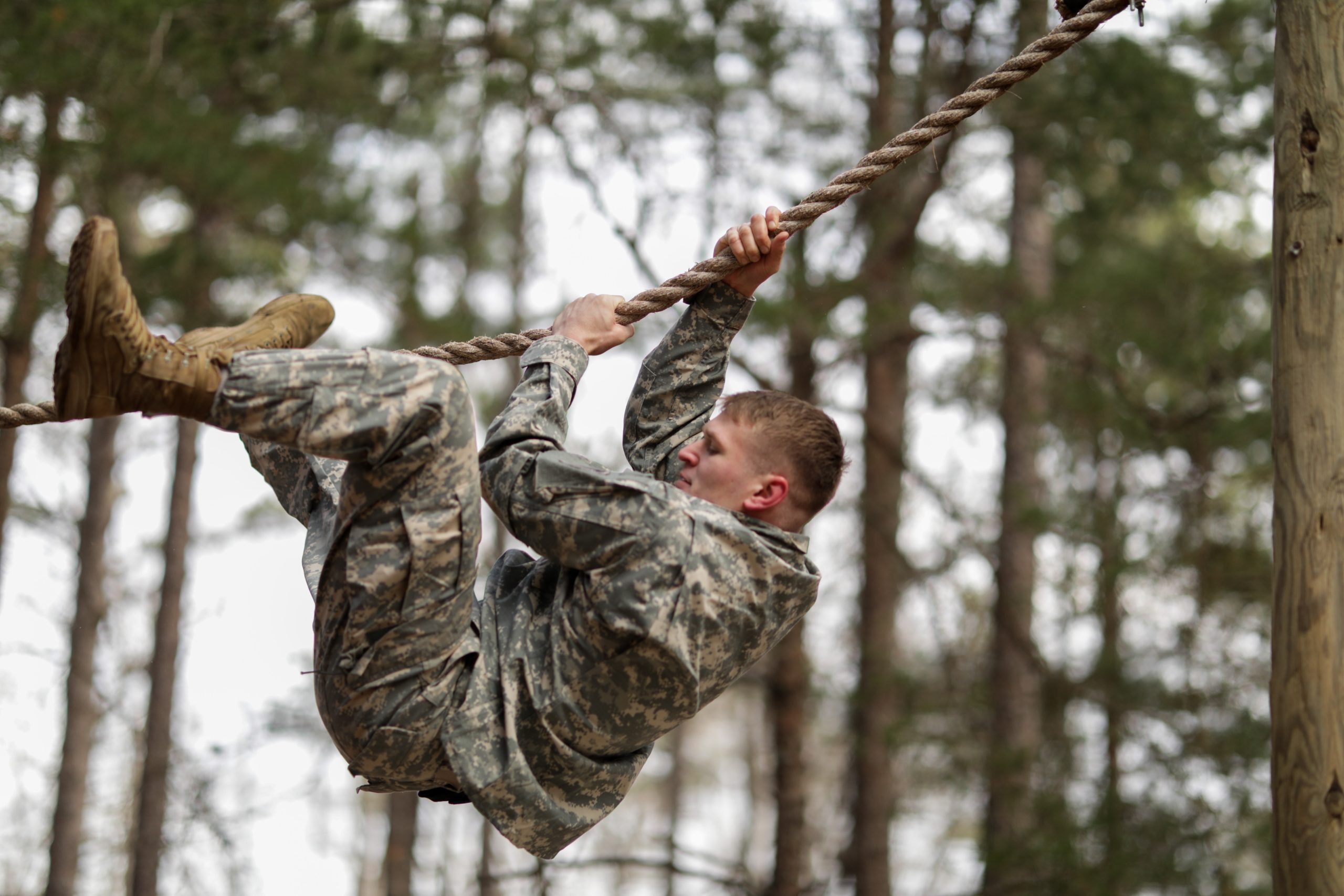Chemical Connections
Andrew Brotherton’s quest to save lives drives his Ph.D. pursuitBy Lynn Roberson
Working weekends as an emergency medical technician while an undergraduate at UNC Charlotte, Andrew Brotherton ’22 learned that quick, accurate diagnosis of heart attacks saves lives and improves patient outcomes. He also realized that emergency responders — and patients — would benefit from diagnostic tools on ambulances and fire trucks.
“There is no worse feeling than having someone’s life in your hands and not being able to help,” Brotherton said.
Now, he is working to invent a new tool for exactly that purpose as a doctoral student in chemistry at Northwestern University. His research is funded by a National Science Foundation Graduate Research Fellowship awarded while he was at Charlotte.
“With the biosensor I am developing,” Brotherton said, “an EMT could prick a patient’s finger, get the patient’s blood and test their troponin levels, which is an indication of a heart attack that you can’t see with an electrocardiogram. Troponin is an enzyme that heart muscle cells excrete when someone is having a heart attack.”
If the biomarker test shows that cardiac-specific troponin has leaked into the bloodstream, emergency responders could give more detailed and immediate data to doctors, provide targeted treatment and potentially route patients directly to cardiac units or hospitals with more specialized services.
Currently, such blood tests are not routinely used in the field for many reasons including a need to send the blood samples to labs for analysis. The main tool available to medical responders for suspected heart attacks is the electrocardiogram machine, which measures and records electrical signals traveling through the heart, looking for blockages or other causes.
Brotherton is investigating the use of self-assembled monolayers as biosensors. Monolayers are one-molecule-thick layers of material that bond to a surface in an ordered way through either physical or chemical forces. His aim, broadly, is to discover new properties and create new or more efficient techniques to detect disease and advance treatments to save lives.

“It’s been wonderful watching Andrew grow and develop as an independent and curious researcher in the lab, through his drive and love of chemistry. He’s not only driven to accomplish his own academic and research goals, but he’s passionate about teaching and helping others.”
– Michael Walter
REAL-LIFE EXPERIENCE INSPIRES RESEARCH
In addition to his adrenaline-pumping experiences as an EMT with the Lincoln County Emergency Medical Services near Charlotte, Brotherton applies knowledge acquired as an undergraduate researcher in the lab of chemist Michael Walter and from others at Charlotte. Brotherton, a Honors College student, graduated summa cum laude with a bachelor’s degree in chemistry and minors in biology and mathematics in spring 2022.

“It’s been wonderful watching Andrew grow and develop as an independent and curious researcher in the lab, through his drive and love of chemistry,” Walter said. “He’s not only driven to accomplish his own academic and research goals, but he’s passionate about teaching and helping others. In my lab, he quickly jumped in and was an author on an extremely high-impact research publication. It’s rewarding to see how his time here laid a solid foundation for him to thrive at a leading research university.”
When Brotherton first came to Charlotte in 2018, his sights were set on medical school. He had completed an EMT course and joined the EMS in Lincoln County because it was interesting and relevant to his interests. As he became familiar with the challenges he and fellow medical responders faced and dove into lab research as a sophomore, his interests shifted.
“The lab is where the real magic happens for me,” he said. “As a physician, you can see only so many patients per day. But if I am able to develop the biosensor, my work will make a wider impact. It has the potential to affect EMTs worldwide. I want the research I do to be used.”
MILITARY SERVICE IGNITES AN INTEREST IN CHEMISTRY

After graduating from Bandys High School in 2014, Brotherton served four years in the U.S. Army as an explosive ordnance disposal specialist and a paratrooper in support of the 82nd Airborne, followed by almost four years with the North Carolina National Guard while at Charlotte. While never deployed overseas, he had illuminating experiences, such as clearing spaces in advance of top-level elected officials.
“My first real exposure to chemistry was through courses in industrial and homemade explosives, and chemical, biological and nuclear weapons,” he said. “The EOD field was interesting and a great experience, but I found myself asking deeper questions about how the molecular world works.”
Later, as an EMT, he gained an appreciation for helping people who faced incredibly challenging and stressful experiences.
“A lot of people go through their entire lives never dealing with high-stress situations that intensify your appreciation for life,” he said. “I love my research. And, as an EMT, I’ve developed an appreciation for what I have in life and an awareness that our time on earth is not that long. You want to do something you’re proud of.”
Lynn Roberson is director of communications for the College of Liberal Arts & Sciences.
Chemical Connections
Andrew Brotherton’s quest to save lives drives his Ph.D. pursuit
By Lynn Roberson
Working weekends as an emergency medical technician while an undergraduate at UNC Charlotte, Andrew Brotherton ’22 learned that quick, accurate diagnosis of heart attacks saves lives and improves patient outcomes. He also realized that emergency responders — and patients — would benefit from diagnostic tools on ambulances and fire trucks.
“There is no worse feeling than having someone’s life in your hands and not being able to help,” Brotherton said.
Now, he is working to invent a new tool for exactly that purpose as a doctoral student in chemistry at Northwestern University. His research is funded by a National Science Foundation Graduate Research Fellowship awarded while he was at Charlotte.
“With the biosensor I am developing,” Brotherton said, “an EMT could prick a patient’s finger, get the patient’s blood and test their troponin levels, which is an indication of a heart attack that you can’t see with an electrocardiogram. Troponin is an enzyme that heart muscle cells excrete when someone is having a heart attack.”

If the biomarker test shows that cardiac-specific troponin has leaked into the bloodstream, emergency responders could give more detailed and immediate data to doctors, provide targeted treatment and potentially route patients directly to cardiac units or hospitals with more specialized services.
Currently, such blood tests are not routinely used in the field for many reasons including a need to send the blood samples to labs for analysis. The main tool available to medical responders for suspected heart attacks is the electrocardiogram machine, which measures and records electrical signals traveling through the heart, looking for blockages or other causes.
Brotherton is investigating the use of self-assembled monolayers as biosensors. Monolayers are one-molecule-thick layers of material that bond to a surface in an ordered way through either physical or chemical forces. His aim, broadly, is to discover new properties and create new or more efficient techniques to detect disease and advance treatments to save lives.
“It’s been wonderful watching Andrew grow and develop as an independent and curious researcher in the lab, through his drive and love of chemistry. He’s not only driven to accomplish his own academic and research goals, but he’s passionate about teaching and helping others.”
– Michael Walter
REAL-LIFE EXPERIENCE INSPIRES RESEARCH
In addition to his adrenaline-pumping experiences as an EMT with the Lincoln County Emergency Medical Services near Charlotte, Brotherton applies knowledge acquired as an undergraduate researcher in the lab of chemist Michael Walter and from others at Charlotte. Brotherton, a Honors College student, graduated summa cum laude with a bachelor’s degree in chemistry and minors in biology and mathematics in spring 2022.

“It’s been wonderful watching Andrew grow and develop as an independent and curious researcher in the lab, through his drive and love of chemistry,” Walter said. “He’s not only driven to accomplish his own academic and research goals, but he’s passionate about teaching and helping others. In my lab, he quickly jumped in and was an author on an extremely high-impact research publication. It’s rewarding to see how his time here laid a solid foundation for him to thrive at a leading research university.”
When Brotherton first came to Charlotte in 2018, his sights were set on medical school. He had completed an EMT course and joined the EMS in Lincoln County because it was interesting and relevant to his interests. As he became familiar with the challenges he and fellow medical responders faced and dove into lab research as a sophomore, his interests shifted.
“The lab is where the real magic happens for me,” he said. “As a physician, you can see only so many patients per day. But if I am able to develop the biosensor, my work will make a wider impact. It has the potential to affect EMTs worldwide. I want the research I do to be used.”
MILITARY SERVICE IGNITES AN INTEREST IN CHEMISTRY

After graduating from Bandys High School in 2014, Brotherton served four years in the U.S. Army as an explosive ordnance disposal specialist and a paratrooper in support of the 82nd Airborne, followed by almost four years with the North Carolina National Guard while at Charlotte. While never deployed overseas, he had illuminating experiences, such as clearing spaces in advance of top-level elected officials.
“My first real exposure to chemistry was through courses in industrial and homemade explosives, and chemical, biological and nuclear weapons,” he said. “The EOD field was interesting and a great experience, but I found myself asking deeper questions about how the molecular world works.”
Later, as an EMT, he gained an appreciation for helping people who faced incredibly challenging and stressful experiences.
“A lot of people go through their entire lives never dealing with high-stress situations that intensify your appreciation for life,” he said. “I love my research. And, as an EMT, I’ve developed an appreciation for what I have in life and an awareness that our time on earth is not that long. You want to do something you’re proud of.”
Lynn Roberson is director of communications for the College of Liberal Arts & Sciences.
